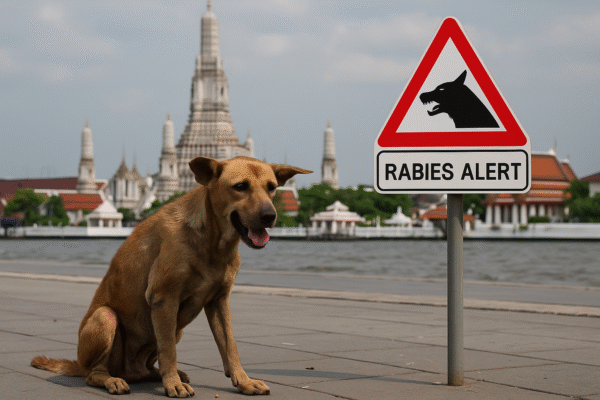A rabies alert has been issued in Bangkok and the neighboring province of Samut Prakan after health officials confirmed multiple cases of infected stray dogs. The Bangkok Metropolitan Administration (BMA), in collaboration with the Department of Livestock Development, has moved quickly to contain the threat. While rabies cases in humans remain rare in Thailand, the disease is fatal if untreated, making this a serious concern for residents and international travelers alike.
Rabies is a viral infection transmitted mainly through animal bites or scratches, especially from dogs and cats. Once symptoms appear, it is almost always fatal, which is why prevention and immediate treatment are critical. For tourists arriving in Thailand during this period, awareness of the situation and adherence to safety measures are essential.
Outbreak Details and Affected Areas
The first confirmed cases were detected in Nong Bon sub-district of Prawet district, an area close to both residential communities and business hubs. Subsequent monitoring revealed further cases in districts including Lat Krabang and Bang Na, as well as parts of Bang Phli in Samut Prakan. These findings prompted authorities to designate certain locations as “temporary infectious disease control zones.”
From September 9 to October 8, 2025, a strict 30-day ban has been imposed on the movement of dogs, cats, and other mammals within the affected zones. This decision aims to curb the spread of rabies and prevent transmission to other areas.
Failure to comply with the movement restrictions can result in heavy penalties, including fines of up to 40,000 baht (around 1,200 USD) or imprisonment for up to two years. Local communities have been urged to report sick, aggressive, or dead animals immediately to help authorities manage the outbreak effectively.
Safety Advice for International Travelers
Tourists visiting Bangkok or Samut Prakan should not panic but remain vigilant. The rabies risk exists mainly through contact with stray animals, which are common in urban and suburban Thailand. To stay safe, travelers are advised to:
- Avoid contact with stray animals: Do not pet, feed, or approach street dogs and cats.
- Seek immediate medical care if bitten or scratched: Rabies can be prevented with prompt post-exposure vaccination. Hospitals in Bangkok and tourist areas are well-equipped to provide treatment.
- Consider pre-exposure vaccination: Particularly for long-term travelers, adventure seekers, or those visiting rural areas where medical facilities may be limited.
- Stay alert for animal behavior: Signs of rabies in animals include aggression, excessive drooling, or lethargy. Report such cases to local authorities.
Even though human rabies cases remain relatively low in Thailand, health officials confirm that seven deaths have occurred nationwide in 2025 across six provinces. This underscores the seriousness of the disease and the importance of preventive measures.
Impact on Tourism in Bangkok and Beyond
Tourism is vital to Thailand’s economy, contributing around 12% to the national GDP. In 2025, the country welcomed over 22 million visitors, a modest decline compared to previous years. News of rabies outbreaks naturally sparks concern among potential travelers, especially as Bangkok is the primary gateway for international arrivals.
While the alert may cause some visitors to reconsider their plans, experts believe the overall impact on tourism will be limited. Thailand continues to attract travelers with its rich culture, temples, cuisine, and world-renowned beaches. Health authorities have emphasized that with proper precautions, the risk to tourists remains low.
Hotels, tour operators, and local businesses have also been briefed to reassure guests and provide guidance on staying safe during their stay. Many touristic areas, including central Bangkok attractions such as the Grand Palace, Chatuchak Market, and riverside districts, remain unaffected by the outbreak zones.
Government Response and Control Measures
Thailand’s government has acted decisively to contain the outbreak. Specialized teams are conducting inspections in affected zones, monitoring stray animal populations, and organizing rabies vaccination drives. Public awareness campaigns are also underway, educating residents and visitors about the importance of avoiding stray animals and seeking medical help when necessary.
Mobile veterinary units have been deployed in high-risk areas to vaccinate pets and strays. In addition, rabies treatment centers in Bangkok and Samut Prakan are on standby to provide immediate care to anyone exposed to potentially infected animals.
The government’s strategy combines short-term containment with long-term prevention, aiming to maintain public safety without disrupting tourism more than necessary.
Looking Ahead
While the rabies outbreak in Bangkok and Samut Prakan has raised understandable concerns, Thailand’s swift public health response should help contain the situation. For tourists, the best course of action is to remain cautious, avoid stray animals, and seek timely medical assistance if exposed.
Thailand remains a world-class travel destination, offering vibrant city experiences, cultural treasures, and natural beauty. With health authorities actively working to control rabies and protect both residents and visitors, travelers who take sensible precautions can still enjoy a safe and memorable stay in the Land of Smiles.
For more travel news like this, keep reading Global Travel Wire


















